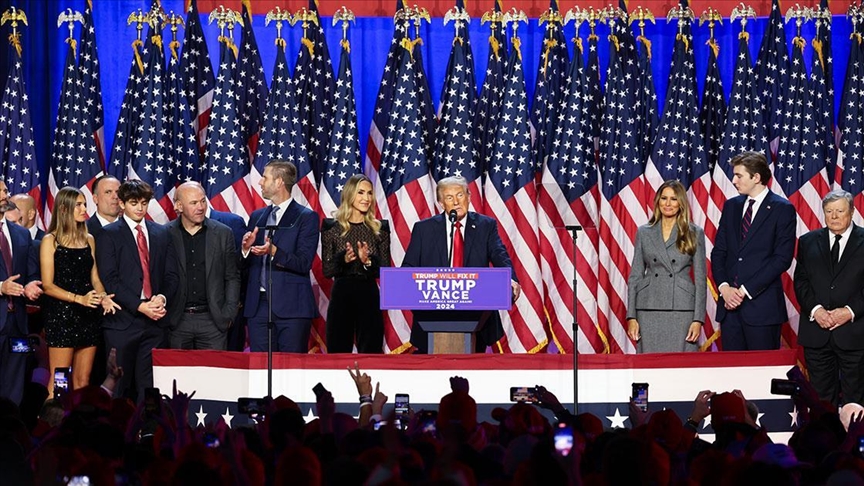

By Anadolu Agency
ISTANBUL
While President-elect Donald Trump is expected to draw the sword of protectionism in the coming years, experts are concerned about possible trade tensions, particularly between the US, Europe and China.
Citing Trump’s reelection, Ilter Turan, emeritus professor in social sciences, said it turns out that the idea promised to Americans — “Make America Great Again” — is really about protecting the American market through tariffs.
It will lead to significant changes in American trade with many of the changes having a negative effect, particularly for Europe and China, Turan told Anadolu.
The German Chamber of Commerce and Industry’s President Peter Adrian said Wednesday that Trump’s win makes trade with the US much more difficult and the business community should prepare for protectionist trade from Washington.
Markets expect to see serious disruptions to Germany’s industrial sector with high tariffs, fueling uncertainty for companies operating in Germany and a slowdown in investments in the new Trump era.
“Now we do not yet know what Trump will do, but based on his past experience, we have seen that he sometimes reshapes his statements after consulting with the power centers in the US, so it is difficult to give comments,” said Turan, who is also the chairman of the executive board of the International Cooperation Platform.
Possible increases in tariffs on China are expected to escalate economic tensions between the two countries and disrupt global trade balances, particularly affecting technology and manufacturing.
Tariffs would dampen economic activity in China
Max Gillman, a professor of economic history at the University of Missouri-St. Louis, said Trump will impose import tariffs, especially on China, which many economists find fair because the Chinese Communist Party (CCP) owns most economic enterprises in China and subsidizes them directly and indirectly through the government in contraindication of the World Trade Organization (WTO) rules to which China has long obliged to respect but refuses to do obey.
Almost all Western economists view China as violating WTO agreements throughout the last two decades to the detriment of US and Western industry, including Türkiye, he told Anadolu.
The tariffs would dampen economic activity in China which would decrease global growth and lessen the financing of increasing Chinese militarism that we have all seen in recent years, he added.
Gillman said Chinese, Russian, Iranian and North Korean militaristic actions would be confronted more directly under Trump through diplomacy, economic growth, NATO enhancement, US military build-up and isolation if needed, for those autocratic regimes.
“This is likely to bring a more peaceful global era that will expand trade across Asia, Europe, and the Middle East,” he said.
The head of an export association in Türkiye (Disyonder), Hakan Cinar, said Thursday that Trump believes the global trade system harms the US and creates huge trade deficits for his country.
Considering that he has already imposed high tariffs against China, it will not be a surprise if he adopts a similar stance in the new term, said Cinar.
“He will restructure trade on the basis of domestic production by supporting investments in domestic production,” he added.
Türkiye-US relations
Turan said it is possible to see effects on Türkiye because the measures usually are based on products rather than countries.
“It will not be easy to make an exception for one country because others will demand the same,” he stressed.
Noting that the US is Türkiye’s third largest market, and Türkiye was hopeful to increase activities in the US, he said the introduction of new tariffs could be a significant obstacle to Türkiye’s expansion.
Touching on Türkiye’s and the US’ trade target of $100 billion, he said: “$100 billion was really an expression of a sincere intention at that time, and perhaps work in this direction will continue.
“As I tried to express, there are serious obstacles in front of us.”
Türkiye and the US set a bilateral trade target of $100 billion for defined sectors during Trump’s previous tenure.
More foreign direct investment to Türkiye, more demand for Turkish exports
Gillman, on the other hand, said: “I believe that President-elect Trump will promote economic growth by enshrining in law the soon-to-be-expiring income tax rate reductions of his 2017 Tax Reduction Act, by further lowering tax rates, by decreasing regulations and by promoting US energy independence such as through allowing pipelines such as Keystone and further oil and gas fracking activity along with increased coal exploration.”
“These growth policies should lower world energy costs, enable higher world economic growth; this would benefit Türkiye immensely by allowing it to expand within a global resurgence in economic growth and trade and more abundant energy,” he said.
Gillman expects increased economic growth to be the main factor affecting Türkiye-US relations in a positive way by encouraging Ankara to further join Western economic expansion, including through NATO cooperation and EU integration.
“Further, by decreasing military aggression by Russia in Ukraine, and bringing it to a halt as I expect President Trump will do, Türkiye will have much less pressure on its resources.
“I expect greater foreign direct investment in Türkiye and encourage Türkiye’s government and industries to increase their activity in obtaining US and EU interest for such activity. And I expect greater demand for Türkiye’s exports,” he said.
Cinar said Türkiye-US trade may slow in Trump’s second term.
During Trump’s last term, the total foreign trade volume between Türkiye and the US totaled $64.6 billion, he said, but under Joe Biden, it reached $90.6 billion, he recalled.
“During this period, we became a country with a trade surplus with the US, I have concerns about maintaining the same positive picture in Trump’s second term,” he added.
We use cookies on our website to give you a better experience, improve performance, and for analytics. For more information, please see our Cookie Policy By clicking “Accept” you agree to our use of cookies.
Read More